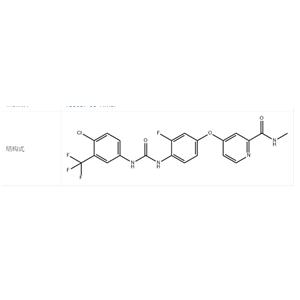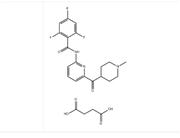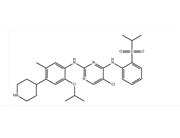Rhegfenib properties Melting point 206.0 to 210.0 ° C Boiling point 513.4 ± 50.0 ° C (Predicted) Density 1.491 ± 0.06g/cm3 (Predicted) Storage conditions Refrigerator solubility DMSO (Slightly), Metal (Slightly) Acid dissociation constant (pKa) 12.04 ± 0.70 (Predicted) Morphology Whitepowder. Color PalePinktoLightPinkCAS database 755037-03-7 Use and synthesis of regafinil Colorectal cancer (CRC) is one of the most common gastrointestinal tumors in clinic. About 1.25 million people worldwide are diagnosed with CRC every year, and more than 600000 patients die. incidence rate and case fatality rate rank third and fourth respectively. Every year, 220000 new CRC cases and 110000 deaths occur in China, ranking fifth in both the incidence rate and the case fatality rate. More than 30% of CRC patients had distant metastasis when they were diagnosed, and quite a few of them could not be cured by surgery. Surgery is the main treatment principle for colorectal cancer. After early surgical resection, traditional Chinese medicine can be used for long-term conditioning without the need for chemotherapy or radiotherapy. In order to improve the survival rate, reduce recurrence and improve the quality of life, Chinese medicine should be supplemented with radiotherapy, chemotherapy and molecular Targeted therapy after middle and late stage surgery. The Essential medicines of the standard chemotherapy scheme include fluorouracil and its derivatives Oxaliplatin and irinotecan, but the cytotoxic substances often produce serious side effects, and CRC has strong resistance to chemotherapy, and the effect of conventional chemotherapy is often unsatisfactory. The emergence of molecular targeted drugs provides new options for the treatment of advanced colorectal cancer, Combining chemotherapy with molecular targeted drug therapy can further prolong the survival period of patients. These molecular targeted drugs include Cetuximab, Panitumumab and bevacizumab. The former two target Epidermal growth factor receptor (EGFR) and show good efficacy in K-Ras wild-type mCRC patients. The latter target Vascular endothelial growth factor (VEGF), regafinil, an oral multi kinase inhibitor, targets tumor formation Tumor angiogenesis and maintenance of signal transduction in Tumor microenvironment.

 China
China



